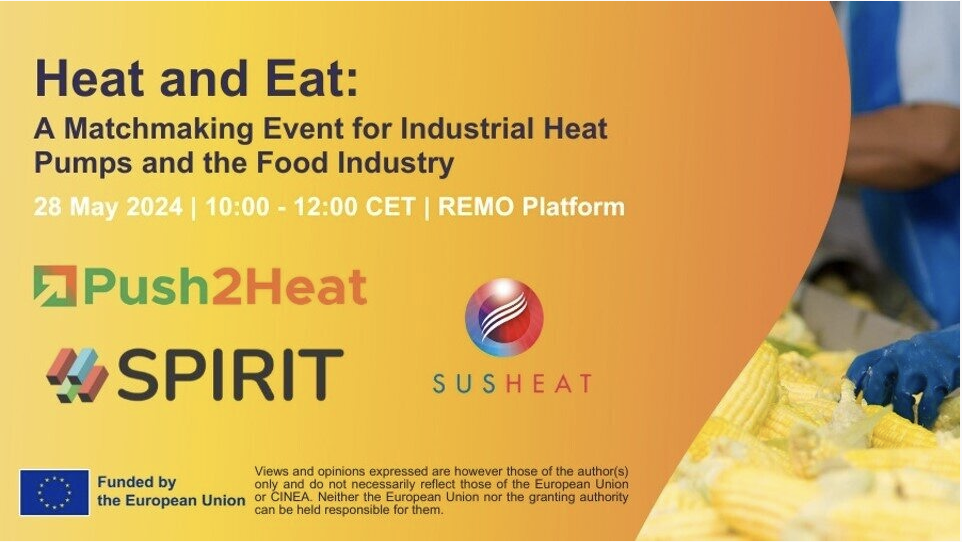
From pineapple to prawns and pints of beer, every part of the food and drink sector can be decarbonised with heat pumps.
By bringing together experts and stakeholders, the “Heat and Eat: A Matchmaking Event for Industrial Heat Pumps and the Food Industry” online event, recorded on 28 May 2024, provided a space for heat pump and component manufacturers and food industry representatives to learn about best practices in the sector and explore relevant EU funding schemes as well as opportunities for collaboration.
The format of choice was an interactive one. It encompassed a first part featuring experts’ presentations – available on the EHPA YouTube channel – and a matchmaking session with five roundtables on five innovative case studies, spanning from prawn processing in Norway to pineapple drying in Uganda.
The event was attended by 133 participants and held in the framework of SPIRIT, PUSH2HEAT and SUSHEAT – three European research projects funded under the Horizon Europe Programme aiming at fostering the uptake of high-temperature heat pumps for industrial use.
Programmes like Horizon Europe provide essential financial support and targeted R&D and help develop technological standards and business models, in line with the EU’s climate goals, explained Eric Lecomte – Policy Officer at the European Commission’s Directorate General (DG) for Energy – in his presentation dedicated to EU-funding schemes and opportunities.
Currently, the EU has several projects focused on heat pump research and deployment in industry, with growing interest from businesses and investors – particularly in the food and drinks sector.
Why? According to Lecomte “industrial heat pumps provide a cost-effective solution to improve energy efficiency and phase out fossil fuels in low-medium temperature industrial processes” such as those used in food and drinks production but also in paper manufacturing, as this joint paper published last year by EHPA with the Confederation of European Paper Industry (Cepi) shows.
Lecomte was followed by Rossen Ivanov – Armstrong International’s EMEA Managing Director. In his presentation, he defines heat pumps as the “silver bullet to thermal decarbonisation in the food industry”. They provide both heating and cooling, are highly efficient and can be integrated with other renewable energy sources – but this is not all. Industrial heat pumps can also recover excess heat, helping industrial processes become circular.
“On-site circularity of industrial waste heat is the only way to both decarbonize and save costs” Ivanov noted.
The first part of the webinar ended with a crucial testimony from the sugar industry, delivered by Josh Gartland – Deputy Director of the European Association of Sugar Manufacturers (CEFS).
Gartland highlighted that the European sugar industry has reduced CO2 emissions by 59% between 1990 and 2021. He noted that all 88 beet sugar factories across the EU are committed to decarbonisation.
“In the EU’s beet sugar factories, heat pumps are already delivering emissions reductions,” Gartland explained. He concluded by praising the SPIRIT Project, which features a demo site in a sugar factory, calling it “an exciting test case for the use of larger heat pumps in the food processing industry.”
The online event then continued with the matchmaking session, in which participants could attend five different breakout rooms. Each room presented use cases of industrial heat pumps in the food and beverage sectors.
This part was not recorded but you can find the case studies in the presentation below:
- Prawn Processing in Norway by Jaran Rauø (Stella Polaris) & Simon Spoelstra (TNO)
Discover how heat pumps are revolutionising Norway’s world-class fish processing industry in this case study on Stella Polaris, the frozen fish brand available in major supermarkets worldwide.
- Sugar Production in Belgium by Jonas Lundsten Poulsen (DTI)
As anticipated by Gartland, sugar manufacturing is increasingly switching to sustainable industrial solutions like heat pumps in its production sites. Learn more about this case study featuring the SPIRIT project.
- A use case from the brewery sector by Priyesh Khandelwal (Futraheat Limited)
Whether you’re a craft beer enthusiast or an industry professional, this is your chance to uncover the secrets behind breweries’ heat pump usage with this case study heading from the U.K.
- Productive use of renewable energy – a pilot system for pineapple drying in Uganda by Daniel Neyer (Neyer Brainworks)
From Austria to Uganda, discover Daniel Neyer’s journey towards climate-neutral and renewable food drying processes bringing pineapples to the top of the fair trade value chain.
- Pelagic fish production in Norway by Arne Høeg (Enerin)
From Norway’s fjords another case study about sustainable fish processing in the Nordics. Don’t miss this presentation to discover how heat pumps are reshaping the seafood industry.
Curious to know more about heat pumps in the food and drinks industry?
Discover our Heat Pump Stories, Resource Hub and Video Series from Anuga FoodTec 2024 – the largest trade fair for food technology in Europe.